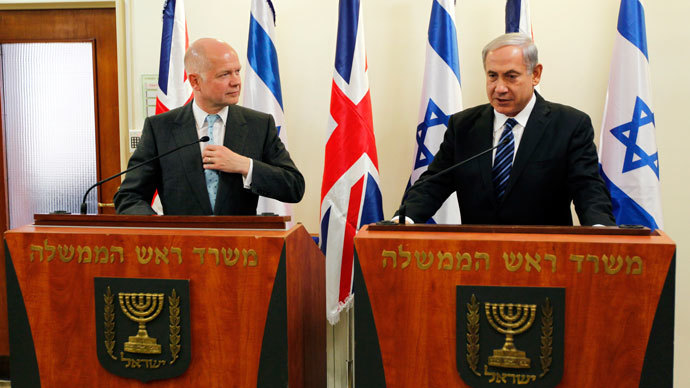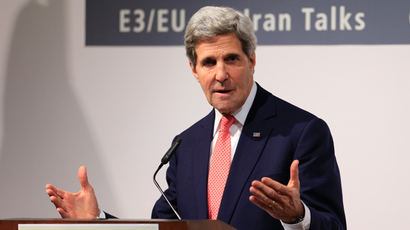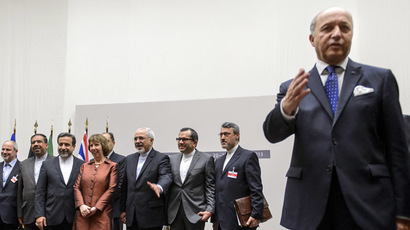UK tells Israel not to disrupt Iran deal as defiant Netanyahu comes under fire

Britain will “discourage” Israel from trying to undermine the nuclear deal with Iran, UK Foreign Secretary William Hague says. Israeli media criticizes PM Benjamin Netanyahu for reacting over “personal failure” as he refuses to be “bound” by the deal.
“We would discourage anybody in the world, including Israel,
from taking any steps that would undermine this agreement and we
will make that very clear to all concerned,” Hague told the
UK parliament on Monday.
He said that there was no apparent sign that any country opposed
to the agreement would try to disrupt it “in any practical
way,” adding that the UK would still be “on its
guard.”
Hague’s words came after Israeli Prime Minister Netanyahu
proclaimed that “Israel is not bound by this agreement”
and his government “will not allow Iran to obtain military
nuclear capability,” calling Sunday’s deal of the six world
powers with Iran a “historic mistake.”
But Netanyahu’s statement of Israel being “by itself” and
ready to act at any moment in defiance of the peaceful
international agreement has prompted media criticism at home.
The Telegraph quoted the mass circulation Yedioth Ahronoth
newspaper as saying that the Israeli Prime minister’s words were
prompted by a “sense of personal failure.”
“This happened on his watch, and it happened despite the fact
that he turned this fight into the battle slogan of his term. But
in his position, personal disappointments cannot go to a person’s
head,” wrote the newspaper’s chief columnist, Nahum Barnea.
Another writer at the same paper, Alon Pinkas, agreed with
Netanyahu’s viewpoint on the deal, but accused the prime minister
of “behaving oddly in the international arena,” saying
such rhetoric “destabilizes” the US-Israeli alliance and
thus only weakens Israel.

“Do insults, aspersions, accusations and complaints advance or
harm the country’s national interests? Is perpetual petulance and
in-your-face bellyaching really a constructive form of
diplomacy?” wondered journalist Chemi Shalev, writing in
Haaretz.
Shalev suggested that Netanyahu’s belligerent personal style had
only contributed to Israel’s diplomatic isolation on the Iran
issue, saying that “the question isn’t whether Israel is
right, but whether it’s smart as well.”
The Haaretz’ correspondent argued that despite the Israeli Prime
Minister’s tone, most of the world’s Jews were “likely to
welcome” the peaceful deal aimed at scaling back the Iranian
nuclear program in return for limited easing of sanctions against
Iran.
Netanyahu “has lost this battle” and has no choice but to “swallow hard and accept the deal,” stressed another Haaretz writer, Amos Harel.
Saudis welcome the deal, mad at US
The landmark deal on the Iranian nuclear program was reached
between Iran and the P5+1 group – Russia, China, the US, the UK,
France and Germany – on Sunday in Geneva. As part of the deal
Iran has been obliged to halt the enrichment of uranium above 5
per cent, dilute its store of 20 per cent-enriched uranium, and
to cease construction on the Arak nuclear reactor. Iran also
agreed to provide the IAEA inspectors with daily access to the
Natanz and Fordo sites. In return, Tehran will be allowed access
to part of its funds frozen abroad as a result of sanctions.
Saudi Arabia on Monday cautiously welcomed the nuclear deal on
Iran.
“If there was goodwill, this agreement could represent a
preliminary step towards a comprehensive solution to the Iranian
nuclear program,” Saudi Arabia’s cabinet said in a statement
carried by state news agency SPA.
Riyadh said it hoped further steps would guarantee the rights of
all states in the region for peaceful nuclear energy.
However, the Saudis also expressed their discontent with how
their Western allies, particularly the US, failed to brief them
on the progress of talks in Geneva.
“We were lied to, things were hidden from us. The problem is
not with the deal struck in Geneva but how it was done,” a
senior advisor to the Saudi royal family, Nawaf Obaid, said at a
think tank meeting in London, stressing that the kingdom was
determined to pursue its own foreign and policy goals.
The official recognition of the deal by the Saudis followed the
welcoming statements by other Gulf States, including Qatar,
Kuwait, the UAE and Bahrain.
Turkey also welcomed the Geneva agreement on Monday. Turkish
President Abdullah Gül earlier tweeted his approval of the deal
with Iran, calling it “a major step forward.”
Ankara hopes the two countries could improve their economic
relations, which suffered due to sanctions, with Turkey’s Foreign
Minister, Ahmet Davutoglu, heading to Tehran on Tuesday for talks
on increasing trade volume and renewing energy projects.
Other than coming from Tel-Aviv, rare criticism of the deal in
the region surprisingly came from Hamas.
“Israel will become the only country now with nuclear and
chemical weapons,” said Musa Abu Marzouk, a senior Hamas
official.
While making Israel “feel safer,” the deal would also end
Iran’s isolation, helping its economy to recover and allowing it
to increase its international influence, the Palestinian argued.
As the US Secretary of State John Kerry is reportedly going to
visit Israel after the Thanksgiving holiday, speculation also
arose, if Netanyahu would give the top US diplomat the cold
shoulder.
According to Israeli newspaper Maariv, there are concerns that
the Israeli Prime Minister’s stance on the Iranian deal could
harm the US-brokered talks with the Palestinians.














